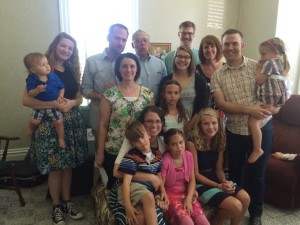My focus on walls started while listening to a friend share about a marriage crisis. As she talked, I could sense that she’d erected a protective wall, shielding herself from further hurt.
I identified with her. I’ve been there and done that. When we feel the pain of flaming darts–whether thrown or imagined– we instinctively put up a wall to block further hurt. 
I’ve also experienced what it’s like for the wall to grow taller and thicker. If it isn’t systematically torn down each time it’s erected, it takes over, blocking more than present pain. Instead, it creates unintended barriers and pain.
According to Brene’ Brown, “When you numb hard feelings, you numb positive feelings too. You can’t be selective.” If allowed to grow, walls stop all true fellowship and eventually the life in the relationship.
A numb heart has difficulty being gracious. Likewise, it has hard time seeing or accepting anything positive from the one who is a perceived threat. A walled heart leads to a sterile, dry, lonely existence—and likely one punctuated with cold remarks and angry outbursts.
When I checked Scripture to see what God said, I found many verses about walls–those around the city. According to the Word, they are obviously good to protect the city. Indeed, it’s bad when the they have a breach or get torn down. I didn’t find any negative connotation about walls.
After prayer and meditation, I determined that all walls are not created equal. We need them around our cities, our communities, and families to keep out the enemy that “prowls about like a roaring lion, seeking someone to devour” (1 Pet. 5:8).
However, if we build walls within the city—or the family, in my example—it disrupts the function of the whole. Each individual is isolated. It’s like building a wall between the head and the heart of a body. If you block communication and fellowship within the body, it can no longer function as one.
Indeed, when we begin building walls to protect ourselves from a family member, unity in the family is broken. Interior walls are a pretty good indication that the enemy has entered through a breach in the exterior wall.
While he didn’t use the analogy of walls that separate, when Paul wrote the church at Philippi, he focused on the need for unity, encouraging them to “stand fast in one spirit, with one mind striving together for the faith of the gospel” (Phil. 1:27). If that is needed in the church, how much more is it true of the family?
When walls go up, it’s because we feel hurt or threatened and we seek to protect ourselves and our interests. We aren’t thinking about unity. We’re trying to avoid pain and discord.
But we don’t need to protect ourselves, because God told us He would “cover you with His pinions, And under His wings you may seek refuge; His faithfulness is a shield and bulwark. You will not be afraid of the terror by night, or of the arrow that flies by day” (Ps. 91:4-5).
Our walls may offer a bit or protection, but they are a denial of God’s shield and refuge. They are a poor substitute for hiding in the Lord because they also block us from God. We need His grace for peace in the midst of the storm and His answers to move beyond it.
The Lord offers protection, comfort, care, and hope for reconciliation.
“The Lord is my rock and my fortress and my deliverer, my God, my rock, in whom I take refuge; my shield and the horn of my salvation, my stronghold. I call upon the Lord, who is worthy to be praised, and I am saved from my enemies.” (Ps. 18:2-3)
stronghold. I call upon the Lord, who is worthy to be praised, and I am saved from my enemies.” (Ps. 18:2-3)
Which is better? Being safely tucked under the comforting wings of the almighty God, or crouching alone behind a hard cold wall?
.
 eral nights. Beds were made, pads and sleeping bags pulled from storage, and bathrooms cleaned and supplied.
eral nights. Beds were made, pads and sleeping bags pulled from storage, and bathrooms cleaned and supplied. made ahead of time. The card table for extra seating was hidden behind a door close by. Things were ordered so our focus could be on relationships rather than on food and housekeeping concerns.
made ahead of time. The card table for extra seating was hidden behind a door close by. Things were ordered so our focus could be on relationships rather than on food and housekeeping concerns.
 art to delight in Him? May Micah’s words be true for me and you too:
art to delight in Him? May Micah’s words be true for me and you too: